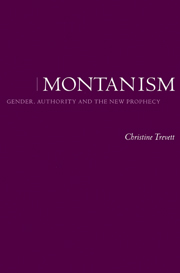3 - The teachings of the New Prophecy
Published online by Cambridge University Press: 10 December 2009
Summary
MONTANUS: THE MAN AND THE ORACLES
Montanus the man
Montanus has a native Phrygian name and first appears, enigmatically, in the village called Ardabau, coming on the stage of history like Melchizedek (Gen. 14: 18f.), without details of ancestry or birth (Heb. 7:3). He was dead by the time the Anonymous wrote and that author did not believe the rumour that Montanus, like Judas Iscariot, had hanged himself (HE v. 16, 15). The Anonymous had no first-hand knowledge of events. It was reported that Montanus was a recent convert to Christianity (HE v. 16, 7), but that may have been said to discredit him. All we really know of Montanus from the early sources is that (i) the mode of his prophesying was noteworthy, with possession and ecstasy and strange manner of speech (HE v. 16, 7; and cf. Miltiades (not Alcibiades) in v. 17, 2f., see 3.2.2–3 below); that (ii) he allowed marriages to be annulled and instituted new fasts (HE v. 18, 2; cf. Hippolytus Refut. omn. haer. viii.19; x.25, and see 3.4–3.5 below), and that (iii) the small Phrygian towns of Pepuza and Tymion were, at his instigation, known by the name ‘Jerusalem’ (v. 18, 3, see 3.3.3 and 3.3.5 below). Then (iv) he won followers and began to organise them: encouraging gatherings in the ‘Jerusalem’ towns of Pepuza and Tymion, soliciting and collecting offerings from the convinced and (perhaps for the first time in Christian history) formally paying salaries to appointed teachers (HE v.18,2).
Points (ii), (iii) and (iv) are considered elsewhere in this study (3.4–3.8), as also is the manner of prophesying which Montanus employed. Nevertheless, the accusations against his mode of prophesying need discussing.
- Type
- Chapter
- Information
- MontanismGender, Authority and the New Prophecy, pp. 77 - 150Publisher: Cambridge University PressPrint publication year: 1996



